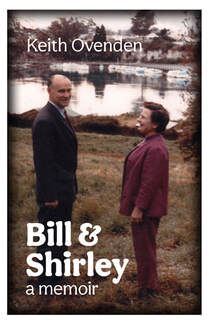
by Keith Ovenden
The really good books are, perhaps, those in which the second reading provides the real insight. If so, Keith Ovenden’s ‘memoir’ of his parents-in-law, Bill Sutch and Shirley Smith, certainly qualifies. Even for those familiar with the Sutch saga in the 1970s, and his infamous spy trial, there is more detail here. More importantly, Shirley now receives equal billing; and though her memoir is separate, it is not secondary.
Having completed a first reading, it is essential to then read the author’s excursus: ‘Between memoir and biography’. For this book is somewhere between a personal memoir and a biography, as it includes some very intimate details. This is because of Ovenden’s inclusion of new revelations in the book that would otherwise be personal secrets, found in private letters between other family members not in the public eye.
One has to have a major reservation about the memoir, where both Bill and Shirley’s late siblings are being exposed. Ovenden states that “a choice of privacy is worthy of respect,” referring to his previous biographical work. But those choices are not made by the deceased who happened to have had more illustrious older siblings. I have to say that the choice to include these secrets is potentially dubious. With regard to Bill, it primarily involves his infidelity, with a woman that is clearly identified; but there is also a further twist to the tale, as evident in her personal letters to Sutch’s sister.
There is also an issue with regard to the memoir of Shirley Smith, and, in particular, her relationship with half-brother Allan. This tends to be based less on documentary evidence, and more on actual experience, but it has now been made public. It’s hard to say if this exposure is really necessary. Shirley was already the subject of a biography, and this information was either not available to the author, or she omitted it.
Nevertheless it seems that Shirley, and her sister-in-law, Helen Smith, had to do a ‘stand by your man’ routine. Shirley could have stayed in England, having received another marriage proposal; and Bill could have remained in New York with his lover, but chose to return to New Zealand. The confirmation of infidelity does not help his cause, and nor does the tolerance of it by Shirley, even if she was always faithful.
It is Shirley that is portrayed as a path-breaking woman, from her move to Oxford University for under-graduate studies at 18, to her career as a lawyer and advocate.
Yet it is the memoir of Bill at the beginning that requires the close reading, before the new revelations of his personal issues, and consideration of his final dénouement. His O.E. was even more prestigious, in gaining a scholarship to do a PhD at Columbia University, and also a greater strain for a working class boy from New Zealand. As Ovenden puts it: “it may be difficult – though I saw it very clearly in the early 1970s – to understand what an immense transformation this was.” He says it created a range of key characteristics, both his sense of insecurity, and an ‘immoderate self confidence’.
But apparently this achievement also enhanced Sutch’s sense of place, and feeling of nationalism, as evidenced in his books. Maybe. But it is worth noting that Sutch was able to combine being part of an intellectual elite, with an enduring left wing perspective; as did Shirley Smith, whose legal practice helped the poorest people in New Zealand. It was their intellectual milieu that disintegrated after Sutch’s acquittal.
Author: Keith Ovenden
Publisher: Massey University Press
ISBN: 978-0-9951318-3-5
RRP: $35.00
Available: Limpbound, available from your local bookshop and online

 RSS Feed
RSS Feed
